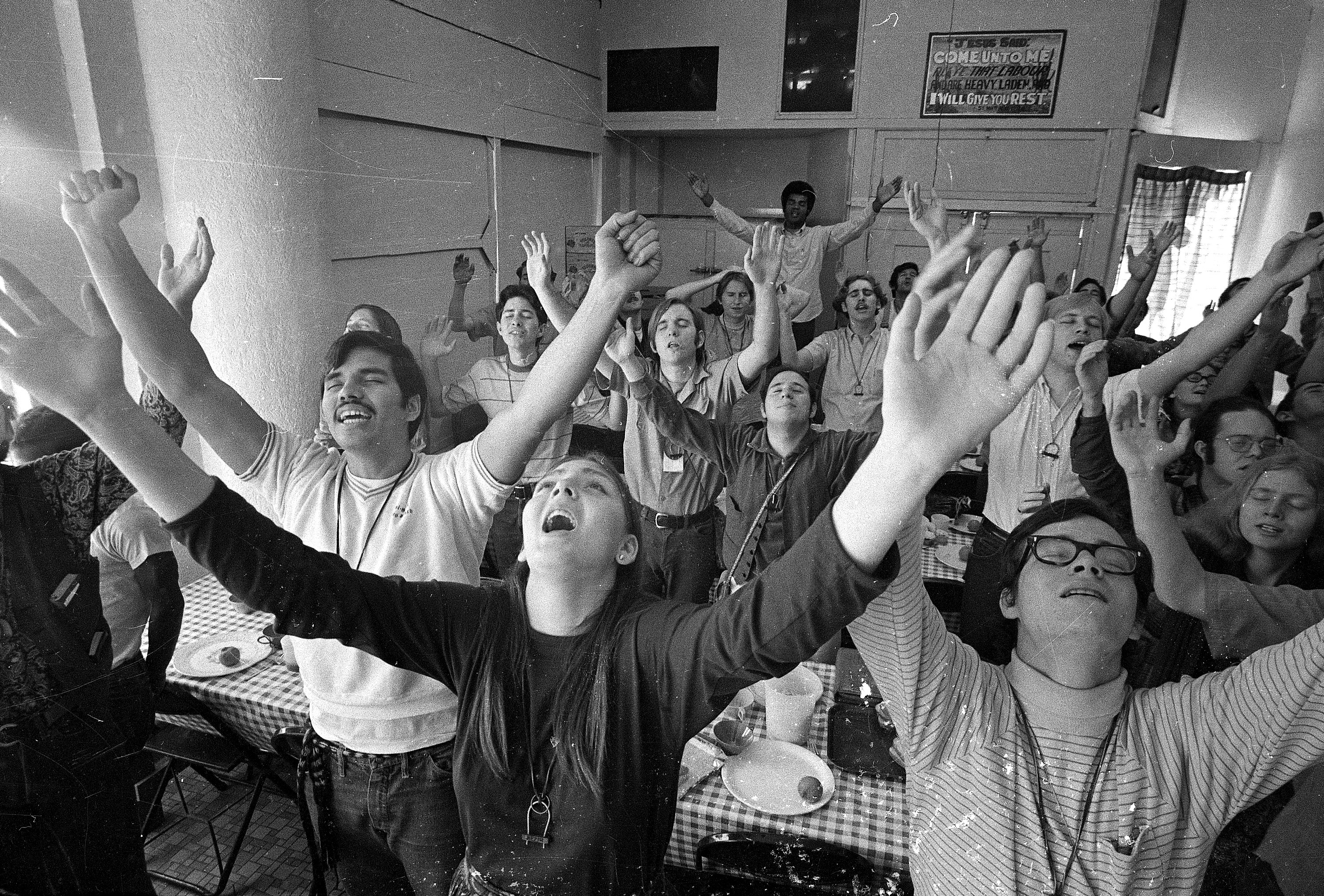Who killed the contemporary Christian music industry?
Remember when dcTalk and Amy Grant were huge?

A free daily email with the biggest news stories of the day – and the best features from TheWeek.com
You are now subscribed
Your newsletter sign-up was successful
Derek Webb's old band, Caedmon's Call, was once the darling of the contemporary Christian music (CCM) industry. Their eponymous debut, released in 1996, sold over 250,000 copies, and their follow-up, 40 Acres, sold about 100,000 more. Caedmon's Call's live shows frequently sold out, and really broadened CCM's demographic. You were as likely to see college students as their parents at Caedmon's Call's shows.
"We had some very unexpected success, very early," Webb explains. "We backed into a moment of success we could have never anticipated. But a wise man once said to me, 'The two things that will ruin an artist are success and failure. And especially in that sequence.'"
Today, Caedmon's Call is a dusty afterthought of a bygone industry. Chances are you've never heard of Caedmon's Call. But the band's story is an interesting microcosm, if not a metaphor, of CCM as a whole. In CCM's heyday, approximately 50 million CCM albums were sold annually. In 2014, that number had plummeted to 17 million. CCM Magazine has long since ceased printing issues, and modern Christian songwriters struggle to penetrate the masses, outside of writing worship songs for church gatherings.
The Week
Escape your echo chamber. Get the facts behind the news, plus analysis from multiple perspectives.

Sign up for The Week's Free Newsletters
From our morning news briefing to a weekly Good News Newsletter, get the best of The Week delivered directly to your inbox.
From our morning news briefing to a weekly Good News Newsletter, get the best of The Week delivered directly to your inbox.
The descent of CCM is a reflection of America's waning interest in Christianity as a whole. The precipitous dropoff in CCM sales has left Christian labels and artists staring into the void alongside their pastors, scratching their heads, wondering where they went wrong.
The birth of CCM can be traced back to the Jesus Movement of the late 1960s, and was shepherded through its infancy by God-fearing hippies like Larry Norman. But it didn't really take off until more than a decade later, as a result of early pioneers like Andrae Crouch and Amy Grant. Grant was especially revelatory, a comely teen whose lyrical vaguaries left it a very open question as to whether she was singing about God or boys. It was a potent strategy, and it led to several Billboard-topping singles and the first Christian album to ever go platinum. Her fame would boost the fortunes of her keyboardist, Michael W. Smith, whose CCM career would go on to become nearly as influential as Grant's.
As these spiritual singers became superstars, they proved that CCM could be more than just something record stores stocked to appease area youth pastors; it was big business. This laid the foundation for the next wave of faithful crooners, including Phil Keaggy, the Newsboys, Steven Curtis Chapman, and Jaci Valesquez. Jars of Clay's inescapable 1995 hit "Flood" made huge waves on college radio. Petra packed out global arenas and sold nearly 10 million albums. Together, these artists helped CCM become one of the fastest growing music genres in America, with many bands finding crossover appeal among both spiritual and secular listeners.
"Back in the '90s, you could believe that Jesus Christ was God and create art that was still interesting, and the general market would respond," says Kevin Max.
A free daily email with the biggest news stories of the day – and the best features from TheWeek.com
He should know. After all, he spent the '90s as a member of dcTalk, unquestionably the decade's greatest CCM success story. Formed in 1989 as a hip-hop trio, the group morphed into a grunge act following the success of Nirvana's Nevermind, and promptly started recording double platinum albums. In 1997, it wasn't unusual to find dcTalk songs on MTV or Billboard charts, making them one of CCM's most prized commodities: a Christian band that also appealed to the culture at large.
In retrospect, it's not hard to see why. The group had an ear for alt-rock aggression that never quite lost its pop sensibilities, and channeled it all into a genuinely thrilling live show. If you ignore the ecclesiastically minded lyrics (a sampling of song titles: "Jesus Freak," "Into Jesus," "So Help Me God"), you might guess you were listening to some pretty good Stone Temple Pilots B-sides.
When Max was asked to join dcTalk, he did so without knowing much about CCM ("To say 'skeptical' would be putting it lightly," he admits) — which may have been just what the act needed. Not knowing the rules helped dcTalk break them all. The lyrics to one cut off the group's 1995 Jesus Freak called "What If I Stumble?" asked, "What if I lose my step and I make fools of us all? Will the love continue when the walk becomes a crawl?" Such bracing questions in a religion known for giving answers gave their music a daring edge.
"We were reaching out," Max says. "We were trying to communicate to the non-believer as much as we were communicating to the believer. Today, when I listen to Christian radio and see the festivals and see what's happening in the church, I don't see a whole lot of that interactivity. Where I'm at right now, it's almost like the doors have shut on the experimenting with lyrics and images and ideas to get people interactive."
That's an assessment echoed by Matt Bronleewe, a veteran CCM producer who helped start Jars of Clay, another '90s CCM titan. Bronleewe has since collaborated with everyone from Michael W. Smith to Nashville's Hayden Panettiere.
"There was a time where you might hear a song about God, but there was an understanding that it might also bring something else to the table," he says.
As the music industry began to weather the disruptions of the digital market, labels grew much warier of those kinds of risks, says Bronleewe. "There's not much room to fail anymore," he explains. "And failure's such a creative gift. When the ability to fail is taken away, it fuels a lot of fear. It narrows the pool of producers and writers to such a degree that there's a sameness that starts to occur."
The CCM industry began relying on sure bets, and the surest bet of all was what's broadly known as "worship music" — songs people sing at church. Initially fueled by musicians like Chris Tomlin and Sonic Flood, worship has since become CCM's primary export — a fact worship-focused bands like Hillsong United have leveraged into playing stadiums around the world.
But whatever CCM might have gained in throwing its fortunes in with worship music, it largely lost in its ability to sneak into the Top 40 or the occasional Now That's What I Call Music! compilation. (One big exception is chart-topping emcee Lecrae, and CCM is clinging to him like a life raft.) For the most part, CCM artists have been content to either play it safe and hold onto their dwindling cut of America's attention span, or strike out on their own and look for other outcasts.
John Mark McMillan has chosen the latter option, crafting some truly memorable rock and roll sets with frequently compelling ruminations on faith. This path hasn't made him wildly successful, but in his words, "I got into this because I love what I do and I want to make the kind of music that I make. Making too many compromises wouldn't be worth it."
"In CCM, if you want to sing about certain, more uncomfortable things, you won't have an opportunity," he says. "But on the same end, if I want to sing about Jesus on Top 40, that's not going to happen either. The gatekeepers in that world are just as weird. The problem is, if I'm a believer and I want to sing my honest thoughts about Jesus, it's like, 'Where do I do that?'"
That's a question many of today's Christian artists may well be asking — musicians with compelling messages and world-class talent, but no labels willing to take a chance on them.
The industry has eased into making church music for churches, unable to recapture the ideas that made it such a prominent force in decades past. At least, that's how Caedmon's Call's Derek Webb feels.
"The way I could describe it for our band is this: You're doing something,” he says. "It's meaningful and it's real and it's observable and it's organic. That becomes your bio. But then two years in, that bio is the most real, organic, meaningful thing about you. And all you're trying to do is maintain the elements of that bio, in hope that you might one day achieve it again. You find yourself making a lot of compromises, but you're still not receiving the nominations or the sales awards. You don't even need anyone to tell you things are dropping off. You put the idea in your own head. You just keep asking yourself the same question: ‘How do we get back to that?'"
That's a question the entire CCM industry is asking itself.
-
 What to watch out for at the Winter Olympics
What to watch out for at the Winter OlympicsThe Explainer Family dynasties, Ice agents and unlikely heroes are expected at the tournament
-
 Properties of the week: houses near spectacular coastal walks
Properties of the week: houses near spectacular coastal walksThe Week Recommends Featuring homes in Cornwall, Devon and Northumberland
-
 Will Beatrice and Eugenie be dragged into the Epstein scandal?
Will Beatrice and Eugenie be dragged into the Epstein scandal?Talking Point The latest slew of embarrassing emails from Fergie to the notorious sex offender have put her daughters in a deeply uncomfortable position